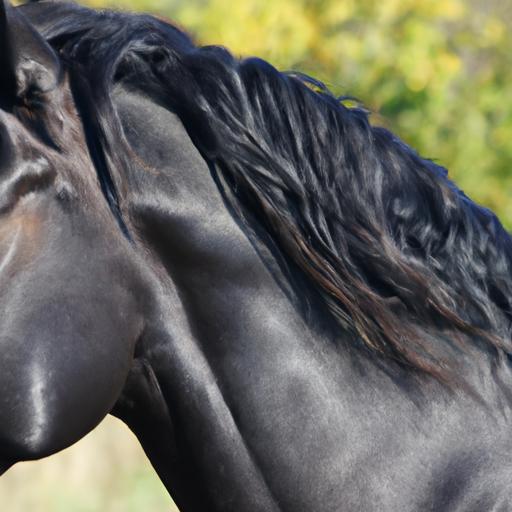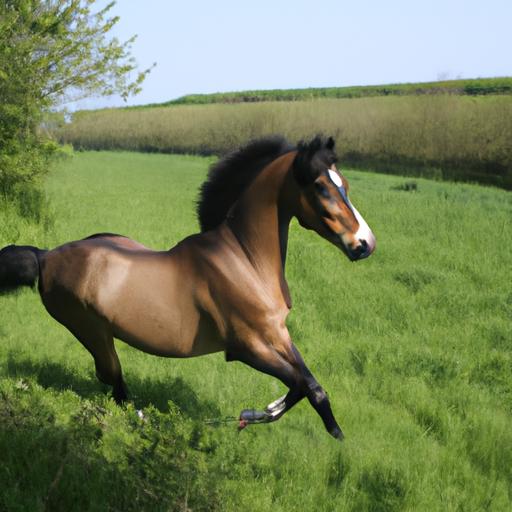Discover the triumphs of dutch horse breeds in dressage, show jumping, and driving. Explore their success in international competitions & notable achievements.
The world of horse breeds is a fascinating realm, each breed possessing its own unique qualities and captivating history. Today, I invite you to embark on a journey to explore the enchanting world of Dutch horse breeds. Renowned for their elegance, versatility, and exceptional performance, these horses have captured the hearts of equestrians worldwide. Join me as we delve into the significance and popularity of Dutch horse breeds, unveiling the rich tapestry of their equestrian heritage in the Netherlands.
The Netherlands, a country known for its picturesque landscapes and rich cultural heritage, has a long-standing tradition of horsemanship. Dutch horse breeds have played an integral role in shaping the equestrian world, leaving an indelible mark with their remarkable attributes. These horses are highly sought after for their striking beauty, athletic prowess, and gentle temperament.
With a history dating back centuries, Dutch horse breeds have thrived in the Netherlands due to meticulous breeding practices and a commitment to preserving their exceptional qualities. The Dutch Warmblood, Friesian horse, and Gelderland horse are among the most notable breeds that have emerged from this land of equine excellence. Each breed possesses distinct characteristics that make them highly versatile and suitable for various equestrian disciplines.
The Dutch Warmblood, known for its athleticism and versatility, has gained international recognition in competitive sports such as dressage and show jumping. On the other hand, the Friesian horse, with its majestic presence and flowing mane, has captivated the hearts of many with its beauty and grace. Lastly, the Gelderland horse, a breed renowned for its strength and endurance, has a rich heritage deeply rooted in agricultural work and driving events.
The allure of Dutch horse breeds extends far beyond their physical attributes. These horses embody the indomitable spirit of their equestrian heritage, representing a legacy of excellence in the Netherlands. As we continue our journey, we will explore their captivating traits, breeding practices, competitive achievements, and the dedicated efforts to preserve their legacy for future generations.
Join me as we uncover the remarkable world of Dutch horse breeds, where elegance meets athleticism, and centuries of equestrian tradition converge. In the following sections, we will delve deeper into the specific characteristics, breeding practices, competitive success, and the future prospects of these magnificent equines. So, saddle up and let’s embark on this exhilarating equestrian adventure together!
Next Section: Characteristics and Traits of Dutch Horse Breeds
Characteristics and Traits of Dutch Horse Breeds

Dutch horse breeds possess a myriad of unique features and physical attributes that set them apart from their counterparts. From their elegant stature to their exceptional athleticism, these horses embody the epitome of equine excellence. Let’s delve into the distinctive characteristics that make Dutch horse breeds truly remarkable.
A. Physical Attributes
Dutch horse breeds are known for their striking appearance and regal presence. With their well-proportioned bodies, strong hindquarters, and expressive eyes, these horses exude grace and elegance. Their muscular build enables them to excel in various disciplines, showcasing their power and agility. A notable feature often associated with Dutch horse breeds is their distinctive movement, characterized by elevated and fluid gaits that captivate spectators.
B. Temperament and Intelligence
Beyond their physical attributes, Dutch horse breeds are renowned for their exceptional temperament and intelligence. They possess a gentle and willing nature, making them highly trainable and suitable for riders of all levels. Their high level of intelligence allows them to quickly grasp new concepts and adapt to different situations, making them versatile performers in a wide range of equestrian activities.
C. Versatility and Adaptability
Dutch horse breeds excel in a multitude of disciplines, showcasing their remarkable versatility. Whether it’s dressage, show jumping, eventing, or driving, these horses demonstrate their adaptability and aptitude for success. Their combination of athleticism, willingness to work, and quick reflexes make them formidable competitors in the equestrian world.
D. Exceptional Work Ethic
One of the defining traits of Dutch horse breeds is their exceptional work ethic. Bred for centuries to be reliable and hardworking, these horses possess a strong desire to please their riders and excel in their tasks. Their willingness to give their all, coupled with their natural talent, makes them valuable partners for riders seeking to achieve their goals.
As we have discovered, Dutch horse breeds possess a captivating blend of physical attributes, temperament, and intelligence that sets them apart. From their elegant appearance to their exceptional work ethic, these horses embody the epitome of equine excellence. In the next section, we will delve deeper into the most popular Dutch horse breeds, exploring their specific characteristics, historical backgrounds, and common uses.
Next Section: Popular Dutch Horse Breeds
Popular Dutch Horse Breeds
When it comes to Dutch horse breeds, there are several remarkable equines that have gained widespread recognition for their exceptional qualities and captivating presence. Let’s take a closer look at three of the most well-known Dutch horse breeds: the Dutch Warmblood, Friesian horse, and Gelderland horse.
Dutch Warmblood
The Dutch Warmblood, also known as KWPN (Koninklijk Warmbloed Paardenstamboek Nederland), is a versatile and athletic breed that has garnered immense popularity both in the Netherlands and across the globe. Renowned for their elegance and grace, these horses excel in various equestrian disciplines, making them a favorite among riders of all levels.
With a strong and muscular build, the Dutch Warmblood combines agility with power. Their expressive eyes and refined head structure add to their overall appeal. They are known for their exceptional jumping ability, making them a dominant force in show jumping competitions. Additionally, their rhythmic gaits and trainable nature make them highly sought after for dressage events.
Friesian Horse
The Friesian horse, with its striking black coat and luxurious flowing mane, is often referred to as the “Black Pearl of the Netherlands.” This breed has a long and storied history, dating back to medieval times, and is deeply intertwined with Dutch culture and tradition.
Friesians are characterized by their noble appearance, high-stepping trot, and abundant feathering on their lower legs. They possess a strong and compact build, exuding power and elegance. Historically, Friesian horses were used for agricultural purposes and as warhorses. Today, their versatility shines through in various disciplines, including dressage, driving, and pleasure riding.
Gelderland Horse
Originating from the Gelderland region of the Netherlands, the Gelderland horse is known for its strength, athleticism, and versatility. These horses were traditionally bred for agricultural work, contributing to their robust build and remarkable endurance.
Gelderlands exhibit a harmonious conformation, combining a powerful frame with elegant movement. They possess a kind and willing temperament, making them versatile partners in both competitive and recreational settings. While they excel in driving events, they are also competent in dressage and show jumping.
These three Dutch horse breeds, the Dutch Warmblood, Friesian horse, and Gelderland horse, exemplify the excellence and diversity of equine heritage in the Netherlands. Each breed has its own unique characteristics, historical significance, and common uses, capturing the hearts of equestrians worldwide.
In the next section, we will dive deeper into the breeding and training practices employed to maintain and enhance these remarkable Dutch horse breeds. So, let’s explore the meticulous methods and techniques that contribute to their exceptional qualities and success.
Next Section: Breeding and Training Practices
Breeding and Training Practices
Breeding practices play a pivotal role in maintaining and improving the exceptional qualities of Dutch horse breeds. The Netherlands has a long-standing reputation for its meticulous approach to breeding, ensuring the preservation of desirable traits while promoting genetic diversity. Let’s delve deeper into the fascinating world of Dutch horse breeders and their practices.
Breeding Practices for Dutch Horse Breeds
Dutch horse breeders carefully select and pair horses with compatible traits to produce offspring that embody the desired characteristics of the breed. The goal is to enhance qualities like athleticism, conformation, temperament, and trainability. Breeding programs often involve extensive research, pedigree analysis, and the consideration of performance records to make informed decisions.
One common practice is the utilization of performance testing for young horses. These tests assess their potential in various disciplines, such as dressage or show jumping. By evaluating their natural abilities and trainability, breeders can make informed choices regarding breeding stock, ensuring the continuation of superior bloodlines.
To maintain genetic diversity, breeders also introduce stallions from other breeds into their programs. This crossbreeding approach aims to enhance specific traits or address any potential weaknesses within the breed. However, breeders exercise caution and adhere to strict guidelines to preserve the integrity and characteristics of the Dutch horse breeds.
Importance of Proper Training Methods
Proper training is crucial for Dutch horse breeds to reach their full potential. The intelligence and willingness to learn exhibited by these horses make them highly trainable. However, it is essential to employ effective and humane training methods to develop their skills and build a trusting partnership.
Training programs for Dutch horse breeds emphasize a balanced approach that encompasses both physical and mental development. Consistency, patience, and positive reinforcement form the foundation of their training journey. Skilled trainers focus on building a strong foundation, starting with basic groundwork and gradually progressing to more advanced exercises.
Understanding the individual characteristics and temperament of each horse is paramount during training. This personalized approach allows trainers to tailor their methods to suit the specific needs and abilities of the horse, ensuring a harmonious and productive training experience.
By utilizing appropriate training techniques, Dutch horse breeds can excel in various equestrian disciplines. Their natural talent combined with a solid training foundation allows them to shine in competitions and forge strong bonds with their riders.
As we continue our exploration, we will delve into the remarkable achievements of Dutch horse breeds in competitive sports. Join me in the next section as we witness the grace and power of these equine athletes.
Next Section: Dutch Horse Breeds in Competitive Sports
Preservation and Future of Dutch Horse Breeds
Preserving the legacy of Dutch horse breeds is of paramount importance to ensure their continued existence and contribution to the equestrian world. Efforts are underway to safeguard their genetic diversity, promote responsible breeding practices, and raise awareness about their historical significance.
Dedicated organizations and breed associations play a crucial role in preserving and promoting Dutch horse breeds. These institutions work tirelessly to maintain breed standards, conduct inspections, and facilitate breeders’ education programs. By fostering collaboration and knowledge-sharing within the equestrian community, they ensure the long-term viability of Dutch horse breeds.
Furthermore, advancements in reproductive technologies have opened up new avenues for preserving the genetic material of exceptional Dutch horses. Through techniques such as artificial insemination and embryo transfer, breeders can expand their breeding programs while safeguarding the breed’s genetic diversity.
Looking toward the future, there is optimism surrounding the continued success and recognition of Dutch horse breeds. Their adaptability, athleticism, and innate talent make them well-suited for various equestrian disciplines. As the demand for versatile and high-performing horses continues to grow, Dutch breeds are poised to make an even greater impact in competitive sports worldwide.
In conclusion, Dutch horse breeds hold a special place in the equestrian world, embodying the rich heritage and excellence of the Netherlands. From their striking physical attributes to their remarkable achievements in competitive sports, these horses continue to captivate enthusiasts around the globe. By preserving their genetic diversity and promoting responsible breeding practices, we can ensure that future generations will have the opportunity to witness the magnificence of Dutch horse breeds.
At Horsemasterypro.com, we celebrate the beauty and grace of Dutch horse breeds and invite you to explore their captivating world. Join us in preserving their legacy and embracing the extraordinary qualities that make them truly exceptional. Together, let us honor the past, cherish the present, and nurture the future of Dutch horse breeds.


